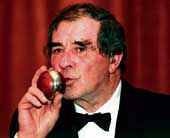 |
Fred Trueman died on Saturday aged 75. His wife, Veronica, issued a brief statement saying: “We lost Fred at 12.15 this afternoon”. The former Yorkshire cricketer was diagnosed with lung cancer in May. He was recognised as England’s greatest fast bowler.
The first man in the game to take 300 Test wickets, the Yorkshireman was statistically and anecdotally superior not only to his 1950s and 1960s contemporaries, but to all who preceded and followed him.
If there was a plausible challenger to Trueman’s place at the top, it was perhaps the man who famously shared the new ball with him for his country ? Brian Statham.
The Roses bowlers gave England a formidable partnership ? and approaching half-a-century on, mention of Trueman and Statham still commands instant respect from those with personal recollection and others who have merely heard.
It was always the Yorkshireman who had his nose in front, though, initially in the race to 250 wickets and then on his way to the 300 ? a landmark he posted against Australia at The Oval in 1964.
When he did so, it was generally assumed cricket would not see the like again.
In terms of aggregate victims, that was to be wide off the mark as more and more Test cricket has been played.
But when it comes to strike rate ? a wicket every 49 balls ? and average (21.57), Trueman’s figures compare very favourably with the world’s all-time best.
‘Fiery Fred’s’ most telling assets, other than the combative nature which gave rise to his alternative mantle, were his pace and a classical action increasingly conducive to judicious outswing.
Trueman was not content, however, to let his wickets alone do the talking. He preferred to do a fair bit of that himself too.
‘The Greatest Fast Bowler That Ever Drew Breath’ was, for example, not merely an apocryphal suggestion when he was asked what might be a suitable title for his forthcoming biography.
Those same outspoken tendencies did not always endear Trueman to authority, and he was no stranger to disciplinary problems ? whether they be to the distaste of national administrators or to the Yorkshire committee.
But none of that stopped Trueman being a central figure in an era of unstoppable success for his County, who won six championship titles in the 1960s.
It was following a less prolific comeback for Derbyshire in limited-overs cricket that Trueman retired, notably to a seat in the commentary box and behind the microphone of the after-dinner circuit.










